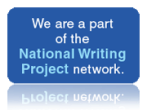“Writing Naked”
By Judy Jester
The first time I wrote a piece for Voices in the Middle, I intended merely to document the nuts and bolts of the annual poetry slam I run at my school. It was fun. Here’s how you do it. But that’s more of the Instructor magazine type article. NCTE expects you to explain why such an endeavor is worthwhile. In attempting to clarify this for others, I discovered it myself. The poetry competition isn’t only fun; it fosters better writing as well. In what eventually resulted in Audience and Revision: Middle Schoolers Slam Poetry (Feb. 1997), I documented the results of interviews with students who said that they revised their poems far more because they knew they would be performing them in front of their peers.
This new understanding greatly impacted my teaching – no longer would I be the only set of eyes to read “published” pieces. If I hadn’t attempted this article, I’m not sure I would have come to it as quickly. This unintentional first foray into reflective practice convinced me that I needed to do far more of it. I recently heard Meenoo Rami, a teacher at the Science Leadership Academy in Philadelphia and the author of Thrive: 5 Ways to (Re)Invigorate Your Teaching, speak. She stated, “Reflective writing is the ultimate act of self-care.” I couldn’t agree more. When I don’t make time for this, my teaching suffers.
Here’s a post I wrote a few months back about not reading. What I didn’t do in it was go far enough and say that if I have dry spells from time to time that my students might too. I might be more empathetic when they do and that if they hear that an avid reader sometimes hits a rough patch that they needn’t throw in the towel. We’ll get through it. And even though this particular blogpost didn’t spell this out, in rereading it, I make this distinction for myself and can act on it. Sometimes reflection just takes time to allow you to see the import for your teaching.
But I’m also interested in growing other teachers too. Whether for a journal article or a post for my blog, I make it a point to write candidly. I appreciate when others do so and find it gives me more validity with my readers when they know I haven’t glossed over the parts that give me fits. Here’s a post I wrote in January about censorship. In it I admit to steering clear of certain books, fearing parental disapproval, and I also take myself to task for doing the same. Maya Angelou once said, “When you write naked, people don’t see your nudity. They see themselves.” That’s what I aspire to in my writing – to help others to see themselves in my teaching.
So whether you’re looking to grow your own professional edge safely in a writer’s notebook or to grow that of others in a more public venue, reflective practice is key to both.
 Judy Jester is an 8th grade English teacher in Landenberg, PA and a co-director of the PA Writing and Literature Project. She blogs regularly at thirdandrosedale.blogspot.com and can be found on Twitter @judyjester.
Judy Jester is an 8th grade English teacher in Landenberg, PA and a co-director of the PA Writing and Literature Project. She blogs regularly at thirdandrosedale.blogspot.com and can be found on Twitter @judyjester.



